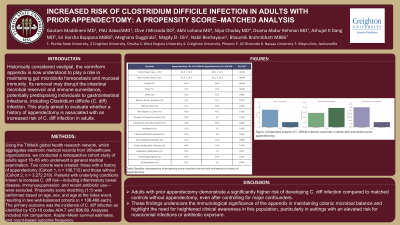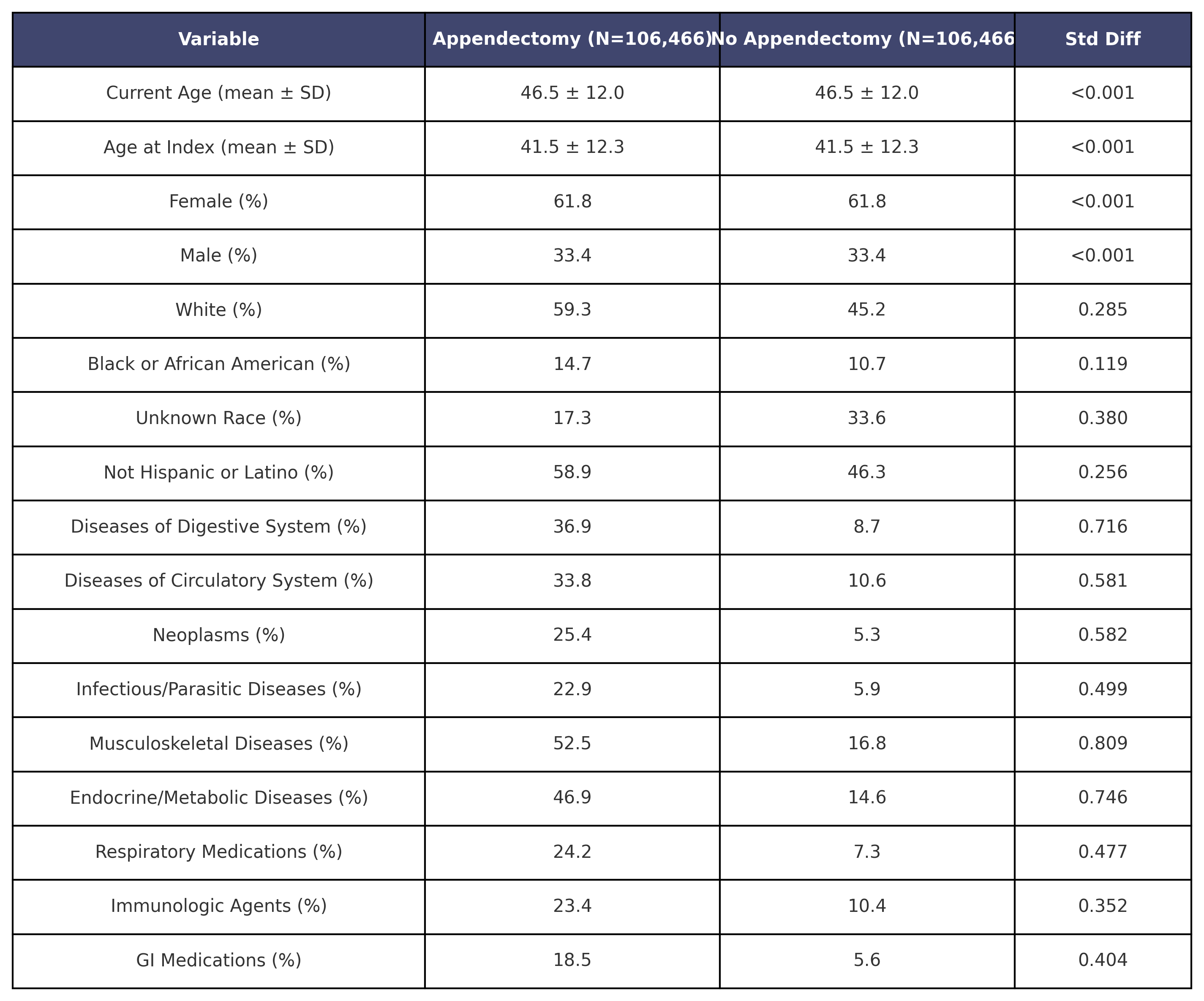Sunday Poster Session
Category: Infections and Microbiome
P1290 - Increased Risk of Clostridioides difficile Infection in Adults With Prior Appendectomy: A Propensity Score-Matched Analysis
Sunday, October 26, 2025
3:30 PM - 7:00 PM PDT
Location: Exhibit Hall

Has Audio

Gautam Maddineni, MD
Florida State University
omaha, NE
Presenting Author(s)
Gautam Maddineni, MD1, Fnu Aakash, MD1, Clive J. Miranda, DO, MSc2, Abhi Lohana, MD3, Silpa Choday, MD4, Osama Abdur Rehman, MD1, Ashujot K. Dang, MD5, Sri Harsha Boppana, MBBS, MD6, Meghana Duggirala, MD7, Magdy El-Din, MD1, Nabil Benhayoun, MD1, Bhaumik Brahmbhatt, MBBS, MD8
1Florida State University, Cape Coral, FL; 2CHI Health Creighton University Medical Center, Omaha, NE; 3West Virginia University Camden Clark Medical Center, Parkersberg, WV; 4Creighton University School of Medicine, Phoenix, AZ; 5University of California Riverside School of Medicine, Riverside, CA; 6Nassau University Medical Center, East Meadow, NY; 7PSIMS, Cape Coral, FL; 8Mayo Clinic, Jacksonville, FL
Introduction: Historically considered vestigial, the vermiform appendix is now understood to play a role in maintaining gut microbiota homeostasis and mucosal immunity. Its removal may disrupt the intestinal microbial reservoir and immune surveillance, potentially predisposing individuals to gastrointestinal infections, including Clostridium difficile (C. diff) infection. This study aimed to evaluate whether a history of appendectomy is associated with an increased risk of C. diff infection in adults.
Methods: Using the TriNetX global health research network, which aggregates electronic medical records from 95 healthcare organizations, we conducted a retrospective cohort study of adults aged 18–65 who underwent a general medical examination. Two cohorts were created: those with a history of appendectomy (Cohort 1, n=106,712) and those without (Cohort 2, n=3,272,219). Patients with underlying conditions known to increase C. diff risk—including inflammatory bowel disease, immunosuppression, and recent antibiotic use—were excluded. Propensity score matching (1:1) was performed based on age, sex, and age at the index event, resulting in two well-balanced cohorts (n=106,466 each). The primary outcome was the incidence of C. diff infection as identified by ICD-10 codes A04.7 and B96.89. Analyses included risk comparison, Kaplan-Meier survival estimates, and count-based outcome frequency.
Results: C. diff infection occurred in 0.7% of the appendectomy group compared to 0.2% of the control group, corresponding to a risk difference of 0.5% (95% CI: 0.4–0.5, p< 0.001). The appendectomy cohort exhibited a significantly increased risk of infection (risk ratio: 3.01; odds ratio: 3.02). Kaplan-Meier survival analysis revealed a lower C. diff–free survival probability in the appendectomy group (97.86% vs. 98.86%, log-rank p< 0.001), with a hazard ratio of 2.46 (95% CI: 2.12–2.85). Additionally, the mean number of C. diff episodes was higher in the appendectomy cohort (0.012 vs. 0.003, p< 0.001).
Discussion: Adults with prior appendectomy demonstrate a significantly higher risk of developing C. diff infection compared to matched controls without appendectomy, even after controlling for major confounders. These findings highlight the immunological importance of the appendix in maintaining colonic microbial balance and suggest the need for heightened clinical awareness in this population, particularly in settings with elevated risk for nosocomial infections or antibiotic exposure.


Disclosures:
Gautam Maddineni, MD1, Fnu Aakash, MD1, Clive J. Miranda, DO, MSc2, Abhi Lohana, MD3, Silpa Choday, MD4, Osama Abdur Rehman, MD1, Ashujot K. Dang, MD5, Sri Harsha Boppana, MBBS, MD6, Meghana Duggirala, MD7, Magdy El-Din, MD1, Nabil Benhayoun, MD1, Bhaumik Brahmbhatt, MBBS, MD8. P1290 - Increased Risk of <i>Clostridioides difficile</i> Infection in Adults With Prior Appendectomy: A Propensity Score-Matched Analysis, ACG 2025 Annual Scientific Meeting Abstracts. Phoenix, AZ: American College of Gastroenterology.
1Florida State University, Cape Coral, FL; 2CHI Health Creighton University Medical Center, Omaha, NE; 3West Virginia University Camden Clark Medical Center, Parkersberg, WV; 4Creighton University School of Medicine, Phoenix, AZ; 5University of California Riverside School of Medicine, Riverside, CA; 6Nassau University Medical Center, East Meadow, NY; 7PSIMS, Cape Coral, FL; 8Mayo Clinic, Jacksonville, FL
Introduction: Historically considered vestigial, the vermiform appendix is now understood to play a role in maintaining gut microbiota homeostasis and mucosal immunity. Its removal may disrupt the intestinal microbial reservoir and immune surveillance, potentially predisposing individuals to gastrointestinal infections, including Clostridium difficile (C. diff) infection. This study aimed to evaluate whether a history of appendectomy is associated with an increased risk of C. diff infection in adults.
Methods: Using the TriNetX global health research network, which aggregates electronic medical records from 95 healthcare organizations, we conducted a retrospective cohort study of adults aged 18–65 who underwent a general medical examination. Two cohorts were created: those with a history of appendectomy (Cohort 1, n=106,712) and those without (Cohort 2, n=3,272,219). Patients with underlying conditions known to increase C. diff risk—including inflammatory bowel disease, immunosuppression, and recent antibiotic use—were excluded. Propensity score matching (1:1) was performed based on age, sex, and age at the index event, resulting in two well-balanced cohorts (n=106,466 each). The primary outcome was the incidence of C. diff infection as identified by ICD-10 codes A04.7 and B96.89. Analyses included risk comparison, Kaplan-Meier survival estimates, and count-based outcome frequency.
Results: C. diff infection occurred in 0.7% of the appendectomy group compared to 0.2% of the control group, corresponding to a risk difference of 0.5% (95% CI: 0.4–0.5, p< 0.001). The appendectomy cohort exhibited a significantly increased risk of infection (risk ratio: 3.01; odds ratio: 3.02). Kaplan-Meier survival analysis revealed a lower C. diff–free survival probability in the appendectomy group (97.86% vs. 98.86%, log-rank p< 0.001), with a hazard ratio of 2.46 (95% CI: 2.12–2.85). Additionally, the mean number of C. diff episodes was higher in the appendectomy cohort (0.012 vs. 0.003, p< 0.001).
Discussion: Adults with prior appendectomy demonstrate a significantly higher risk of developing C. diff infection compared to matched controls without appendectomy, even after controlling for major confounders. These findings highlight the immunological importance of the appendix in maintaining colonic microbial balance and suggest the need for heightened clinical awareness in this population, particularly in settings with elevated risk for nosocomial infections or antibiotic exposure.

Figure: Table: Baseline characteristics of propensity score–matched cohorts with and without a history of appendectomy

Figure: Figure: Comparative analysis of C. difficile infection outcomes in adults with and without prior appendectomy.
Disclosures:
Gautam Maddineni indicated no relevant financial relationships.
Fnu Aakash indicated no relevant financial relationships.
Clive Miranda indicated no relevant financial relationships.
Abhi Lohana indicated no relevant financial relationships.
Silpa Choday indicated no relevant financial relationships.
Osama Abdur Rehman indicated no relevant financial relationships.
Ashujot Dang indicated no relevant financial relationships.
Sri Harsha Boppana indicated no relevant financial relationships.
Meghana Duggirala indicated no relevant financial relationships.
Magdy El-Din indicated no relevant financial relationships.
Nabil Benhayoun indicated no relevant financial relationships.
Bhaumik Brahmbhatt indicated no relevant financial relationships.
Gautam Maddineni, MD1, Fnu Aakash, MD1, Clive J. Miranda, DO, MSc2, Abhi Lohana, MD3, Silpa Choday, MD4, Osama Abdur Rehman, MD1, Ashujot K. Dang, MD5, Sri Harsha Boppana, MBBS, MD6, Meghana Duggirala, MD7, Magdy El-Din, MD1, Nabil Benhayoun, MD1, Bhaumik Brahmbhatt, MBBS, MD8. P1290 - Increased Risk of <i>Clostridioides difficile</i> Infection in Adults With Prior Appendectomy: A Propensity Score-Matched Analysis, ACG 2025 Annual Scientific Meeting Abstracts. Phoenix, AZ: American College of Gastroenterology.
